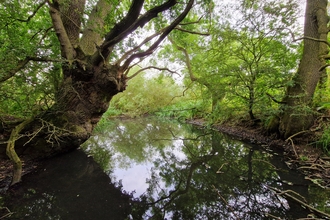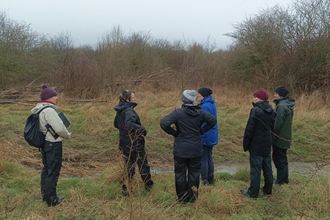“All this rain is miserable, but it’s great for the garden and the rivers will be fine now!”. I’ve heard that quite a few times this week. The most important thing needed for a healthy river is water – a constant supply of it. Our most important river habitats are our chalk streams, which rely on a constant supply of water from a chalk aquifer. This is the same aquifer which supplies the taps in and around Cambridge, and it’s not in a good way right now. The River Cam this May had the lowest flows for that month since records began in 1949.
Our chalk streams are special – there are only about 200 chalk streams in the world, and most of them are in the southern half of England (with a few in France). In Cambridgeshire chalk streams run out of the hills between Melbourn and Newmarket, becoming vital tributaries of the River Cam.
They rely on a water source we can’t see, concealed in an expanse of chalk landscape. Rainwater filters into the chalk and seeps out at geological boundaries at a surprisingly constant rate and temperature, creating the unique environment. At least, it should. Levels in the aquifer are so low that the only reason our chalk streams are flowing now is that water is pumped into them at the top. This water is often augmented by the outflow from water treatment works further downstream - but if we augment the flow in the streams, how can we tell how much water is actually in the ground?
After such a dry 12 months, the ground is hard and dry. Most of the current rainfall is running straight off the land, causing some localised flooding, and not recharging our aquifers or even helping the soil as much as we would hope. In the Cambridge area, all the tap water we use is stolen from the rivers, so any efforts to use less of it directly benefits chalk streams and their iconic wildlife such as brown trout and kingfisher. Useful tips on saving water can be found at Waterwise and Save water save money.
The current approach is clearly not sustainable. We urgently need to realise that in new developments, as well as in our own homes, we need to stop taking our water for granted.




